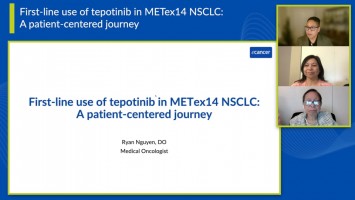The ASCEND-3 trial is a phase II trial including patients with ALK-positive tumours previously treated with chemotherapy. The inclusion from these patients was in 2013, the primary objective was response rate and here in this meeting we have updated the response rate, that is 65% of all patients, and also we have updated the progression free survival, that is 16.6 months according to the investigators, 19 months according to the independent review.
What is important from the ASCEND-3 trial is that we have presented the overall survival information with longer follow-up. Overall survival from the patients included in the trial is 51 months, so more than four years.
Significant data.
Yes, this information is important to stress the relevance to test the non-small cell lung cancer patients with stage 4 for a number of molecular alterations such as EGFR, ALK and ROS. For this group of patients we know that it’s an uncommon situation, it’s 2-3% of the patients, but we have very effective agents and we have also long survival outcomes.
Beyond the availability of sequencing are there any barriers to implementing ceritinib as a standard of care for this population?
At this moment for patients with ALK positive tumours according to the ESMO guidelines and also the NCCN guidelines we have a number of agents that are available in first line. So crizotinib was the first agent approved but we have also ceritinib, alectinib and probably in the future we will have brigatinib, such a recent study, it was also compared to crizotinib. So we have the possibility not of only one drug, we have a number of agents that are available as a first line. We have to decide probably in each individual patient according to the availability, that is important, but also other aspects such as CNS activity and also toxicity of agents.
By way of comparison of toxicity then, looking at other ALK inhibitors are there any that take more or less to tolerate?
There is no direct comparison between ceritinib and other ALK inhibitors. There is a comparison between crizotinib and alectinib and crizotinib and brigatinib and overall it seems that alectinib is better tolerated than crizotinib. This is the situation. With ceritinib the comparison in first line is against chemotherapy; of course ceritinib is better tolerated than chemotherapy but there are some issues with GI toxicity. In the same presentation in the same session there was another abstract analysing a reduced dose of ceritinib, 450mg, with a low fat meal. With this schedule the toxicity was lower.








